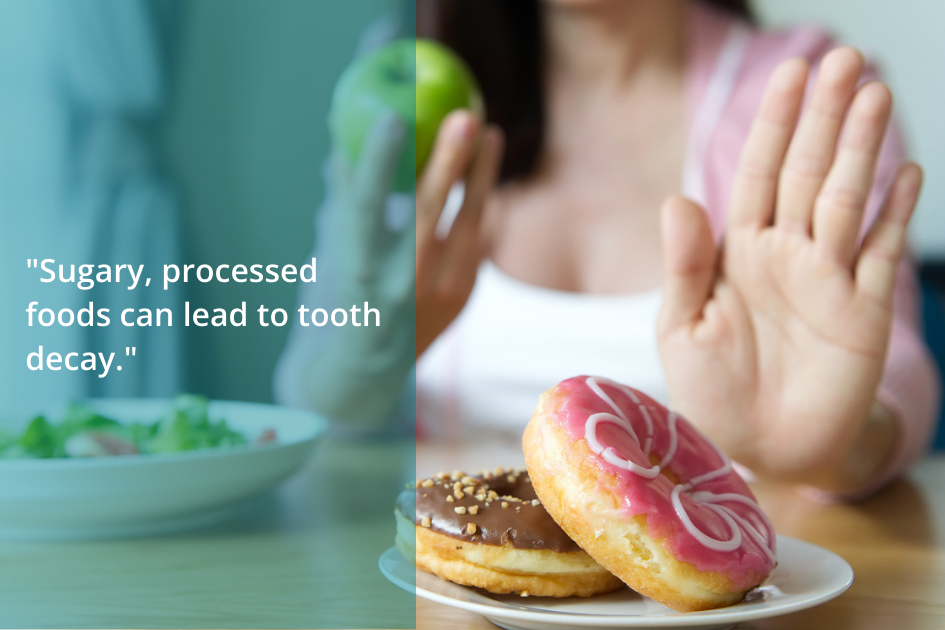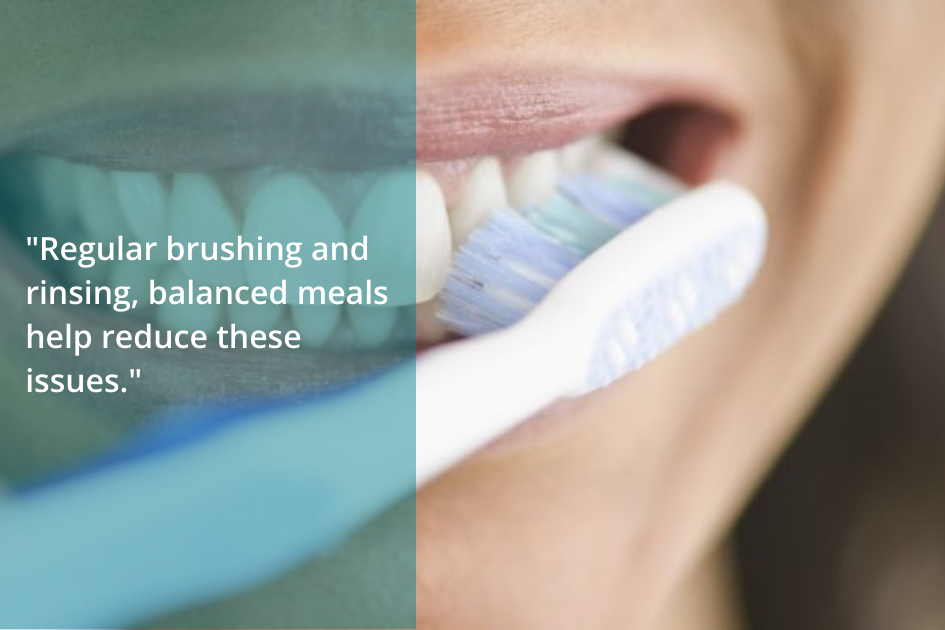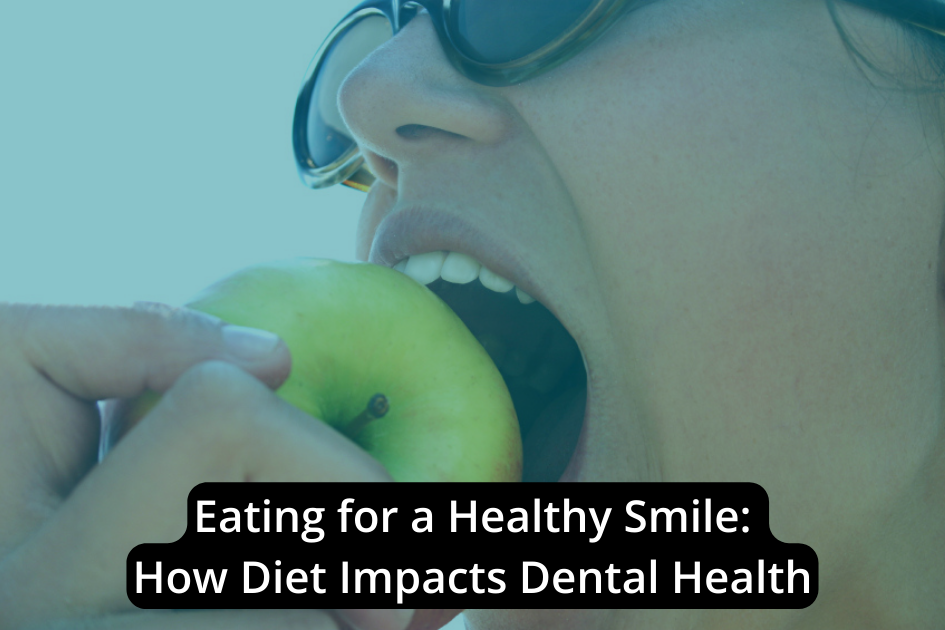Our diet greatly influences our dental health. Sugary, processed foods can lead to tooth decay. The sugar interacts with plaque, creating acid that weakens enamel and forms cavities. Acidic foods compound this issue by directly damaging enamel. Starchy foods like white bread, when stuck in the teeth, also feed bacteria, causing decay. Teeth staining occurs from consuming substances like tea and red wine. Regular brushing and rinsing, balanced meals, and a keen eye on the foods we consume help reduce these issues. If you continue reading, you’ll find more on maintaining excellent oral health.
Understanding Tooth Decay
To fully grasp the impact of diet on dental health, let’s first understand tooth decay, a common issue that arises largely from our dietary choices. Tooth decay happens when sugars, including sucrose, fructose, and glucose, interact with plaque bacteria in our mouths. This interaction forms acids that launch repeated attacks on the enamel, the hard, protective outer layer of our teeth.
Over time, these acid attacks can break down enamel, leading to the formation of cavities in the dentine, the sensitive layer beneath the enamel. Once this enamel layer is compromised, decay can accelerate, making teeth more vulnerable.
Processed foods, often high in sugars, can hence significantly harm our teeth and promote decay.
Foods That Cause Decay
Let’s now turn our attention to the specific foods that contribute to tooth decay.
We’ll examine the role of sugary and acidic foods, how starchy foods can increase the risk of cavities, and why frequent snacking can be detrimental to our oral health.
Additionally, we’ll discuss foods that have the potential to stain our teeth over time.
Sugary Foods and Cavities
Getting into the topic of sugary foods and cavities, it’s essential to understand that candies, sodas, and pastries, packed with sugar, fuel bacteria to produce acid in the mouth, subsequently leading to enamel erosion and cavity formation.
- Bacteria feast on sugar, creating acids that assault our teeth for about 20 minutes after consumption, escalating the risk of decay.
- Regular intake of sugary foods and drinks can weaken enamel, revealing the inner tooth layers, resulting in sensitivity and pain.
- Sticky sugary foods like caramels provide a constant sugar source for bacteria, promoting cavity formation.
To maintain our dental health, we must limit our sugary food intake and uphold good oral hygiene practices. This prevents cavities, thus preserving our smiles.
Impact of Acidic Foods

While limiting sugary foods is an effective strategy for cavity prevention, it’s equally essential to be aware of the damage caused by acidic foods that can lead to tooth decay. Foods like citrus fruits and vinegar, or any with a pH below 5.5, weaken tooth enamel, consequently increasing susceptibility to cavities and other dental problems.
Regular consumption intensifies enamel erosion and tooth sensitivity. The acidic environment these foods create in the mouth encourages bacterial growth, escalating the risk of cavities and gum disease. Balancing the intake of acidic foods with alkaline options, such as water, milk, and leafy greens, can help neutralize acid impacts on teeth, acting as an important step towards maintaining good dental health.
Starchy Foods’ Dental Risks
Starchy foods, such as white bread and potato chips, pose a significant risk to dental health as they can easily become lodged in teeth, leading to an increased risk of cavities. These foods break down into sugar, feeding the bacteria that cause plaque buildup. This is particularly problematic for children, who may not be as diligent with their oral hygiene.
Here’s what we need to keep in mind:
- Starchy foods stuck in the mouth can lead to dental issues, especially in children.
- Regular rinsing and brushing after meals can help prevent decay and plaque buildup.
- Balancing starchy foods with a diverse diet of fruits and vegetables is key to maintaining dental health.
Teeth Staining Culprits
Beyond the dangers of starchy foods, our dental health can also be compromised by certain foods and beverages known for their staining properties, such as coffee, tea, and red wine. These common culprits contain dark pigments that gradually darken the appearance of our teeth over time.
While proper oral hygiene, including regular rinsing, can help reduce the effects of these staining foods, not all discoloration can be avoided. Factors such as medications and genetic predispositions can also influence teeth staining.
Thankfully, professional whitening treatments exist to effectively address and manage such discoloration. Hence, being aware of the foods we consume and maintaining an effective oral hygiene routine are essential for preserving our dental health.
Dangers of Frequent Snacking
In the world of dental health, frequent snacking can pose a serious threat, as it exposes our teeth to continuous sugar and acidity attacks, leading to an increased risk of decay. We’re fundamentally inviting tooth decay by allowing sugars and acids to linger on our teeth, causing enamel erosion and cavities.
Here are three important points to remember:
- Saliva is our first line of defense against sugar and acidity attacks. However, constant snacking hampers saliva’s protective effects.
- Frequent snacking leads to continuous exposure of our teeth to damaging substances, accelerating enamel erosion.
- Maintaining good oral hygiene, including limiting snack intake, is key to preserving dental health.
In essence, respect your mouth’s natural defense system and remember, moderation is key.
Ideal Drinks for Dental Health
While maintaining a balanced diet, it’s equally important to pay attention to our liquid intake, especially because certain beverages can immensely influence our dental health. Water and milk are excellent choices, hydrating us while simultaneously protecting our teeth.
Be cautious with fruit juices; while they can be part of a balanced diet, their acidity can contribute to enamel erosion if consumed frequently outside mealtimes. Opting for diluted, sugar-free fruit drinks can be a safer alternative.
Be mindful that some soft drinks contain sweeteners that are unsuitable for young children, negatively affecting their dental health. By choosing our beverages wisely, we can make a significant positive impact on our oral health, ultimately contributing to our overall well-being.
Importance of a Balanced Diet
Maintaining a balanced diet, rich in vitamins and minerals, isn’t just essential for our overall health, but it’s also a cornerstone for preserving our dental health. A well-balanced diet impacts our gum health, enamel health, and regulates plaque production.

To guarantee excellent dental health, consider these three points:
- Prioritize whole grains, fruits, vegetables, and proteins, as they’re rich in essential vitamins and minerals.
- Limit sugary foods and drinks. These can lead to cavities and gum issues.
- Understand that a nutrient-depleted diet can increase plaque production, which may lead to gum disease.
Conclusion
To ensure your dental health is at its peak, it’s crucial to pay attention to what you consume. Whether it’s choosing the right foods or sipping on healthier drinks, every decision counts towards a healthier smile.
But why stop there? Visit us at Great Oaks Dentistry in New Braunfels, TX, where our team of experts is ready to guide you towards the best dietary choices for your dental well-being. Let’s work together to keep your smile bright and healthy.
Book your consultation today and take the first step towards a happier, healthier mouth. Remember, a radiant smile begins with the right care and nutrition. Join us in making dental health a priority!

